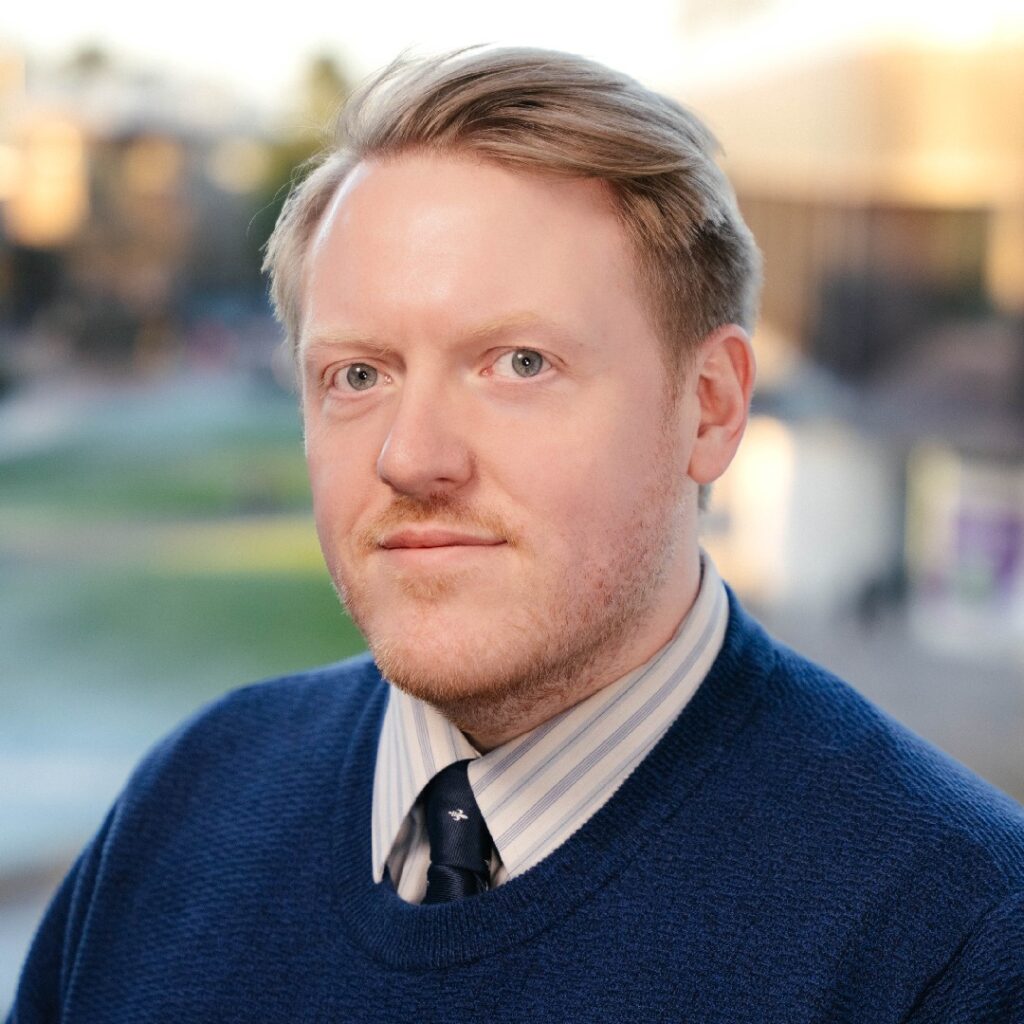
We caught up with Dr Steven Daniels, Lecturer in Politics at Edge Hill to find out how he became interested in politics and why so many people are choosing to study this subject at degree level.

Can you tell us about your career background and how you came to be at Edge Hill.
I was born and raised in Liverpool. My undergraduate degree was in history and politics and my Masters degree in twentieth century history. I’ve long ‘sat on the fence’ between the two disciplines, which makes me and my research a good fit for Edge Hill University and this department. I completed my PhD in politics, and have worked and studied in a variety of institutions in the UK and abroad. I was thrilled to be offered a job at Edge Hill, having originally joined the law department, before moving into my current post.
Highlights of your career/teaching career.
I’ve previously been featured in the national media for my research into trade unions, particularly during the aftermath of the 1984-5 Miners’ Strike; and found some fascinating archival documents on the Battle of Orgreave. More recently I’ve been commenting on recent Conservative governments and the ‘new’ Winter of Discontent, and if this marks a revival of the trade union movement. I also enjoy media interviews and commenting about politics to a wider audience on behalf of Edge Hill University.
I enjoy teaching, and try to make lectures as engaging and interesting as they possibly can be. I enjoy trying new ways of relating content and enhancing learning. For example, with our US Politics students, we play a version of Model UN, and even play a version of war games! Graduation is typically my highlight of the year. It is such a happy day, and students rightly take pride in everything they have worked so hard to achieve, and enjoy celebrating with friends and family.
What are your specialist research areas and how can students get involved.
My major research focus is trade union decline. Having once been a body powerful enough to bring down governments, today unions can barely influence their own industries. Yet, unions were vital in achieving so many things we take for granted, such as the eight-hour workday, or sick and holiday pay. It’s a push-and-pull relationship that won’t end anytime soon between workers and decision makers. Through projects here at Edge Hill such as the Politics Lab, our students get to engage with decision makers through select committees, or even local MPs. One Politics Lab project even helped influence the law, the British Sign Language Act 2022.
Why do you think politics and international relations is becoming a popular subject area to study?
Since 2016, Politics and International Relations has been a roller coaster that shows no signs of slowing: the consequences of Brexit are yet to be fully felt, Trump stands a real chance of being re-elected as US President, and the War in Ukraine shows no signs of ending anytime soon. Students are increasingly realising politics is the world around them, and they want to better understand how that world is shaped. It is therefore welcomed to see increasing numbers of students taking politics as an A Level subject. Aside from the actual content learnt in our BSc (Hons) Politics & International Relations degree, it is a great subject to take if you want to get involved in ‘real world’ politics. If you’re not completely sure of your career path, politics teaches a lot of ‘soft skills’ transferable and applicable to a wide range of industries and occupations
What are the benefits to the “international relations” element of our politics degree?
Huge benefits. Look at the big issues today – migration, war in Ukraine, climate change. Responding to these is not something that can be done within national borders. What other countries do affects us here and vice versa. So, understanding the politics of other countries, and understanding how nations relate to each other and how things like the United Nations work is important. Knowing about the world outside the UK is also very useful career wise. And when you consider that on our BSc (Hons) Politics & International Relations degree you can also learn a language, it’s easy to see how it all fits together.
What are the benefits of studying politics and international relations at Edge Hill University?
At Edge Hill, our degree content is as real world as possible. That means projects linked to real political organisations, it means guest speakers and visits (for example Scottish Parliament, the Labour Party Annual Conference, Westminster). Staff are well connected and so can put students in touch with politicians and others in that environment. And we have a good range of expertise and experience with staff involved in expert networks from international law to the ins and outs of local government.
What transferable skills will politics and international relations students gain?
Loads. We cover a multitude of writing styles – you can learn how to write a speech as well as an essay, a policy report as well as a literature review. Students on our courses currently have had articles and podcasts published, have engaged with select committees and have suggested topics for parliamentary questions. We hold debates and co organise events. These all build the key skills employers are looking for. Edge Hill graduates have gone on to work for MPs, for charities (in public affairs roles), for the Houses of Parliament, in journalism, in public relations, for trade bodies and so on. Some have gone into teaching. Others have taken on further study and aspire to be the political researchers of the future.
There has never been a better time to study Politics and International Relations.
September 26, 2024


